菅さんが総裁選不出馬を宣言。コロナ対策では批判が多いが、高齢者から先にワクチンを打ち、国全体として重傷者リスクを減らしたのは大きな功績。
本人や政府は、もっと胸を張ってもいいのに、そうしないのは何故か。トランプさんだったら100倍くらいに誇張して言うであろうに。
余裕がなくなっていた?発信力の問題?!
以下、
株式会社 日本総合研究所 主席研究員、株式会社 日本政策投資銀行 地域企画部 特任顧問
藻谷浩介氏、2021年8月30日の講演「オリンピックと第五波の決算 ~ データから見た第五波の真実 ~」より抜粋。
詳しく知りたい方は是非、藻谷氏の講演をどうぞ。資料はいただけます。
<日本はかなり良い方では?>
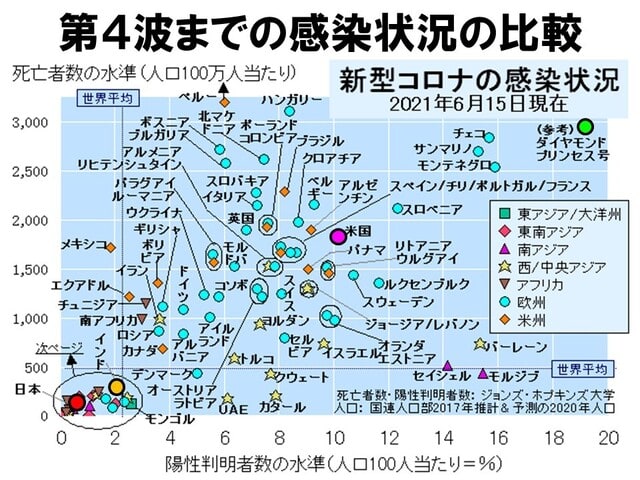
<ワクチンの効果は?>
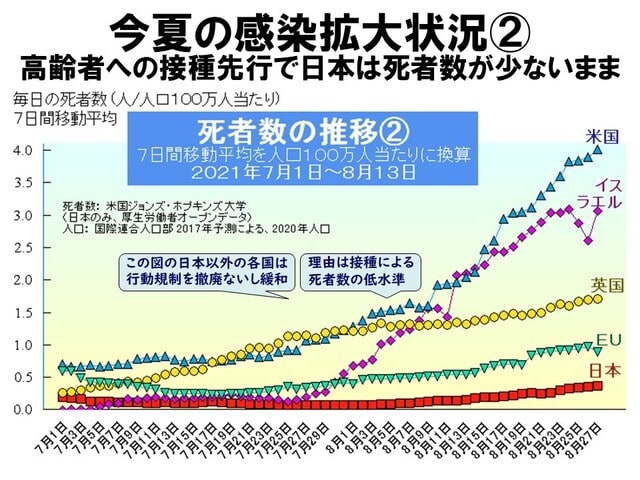
<ピークは過ぎた>
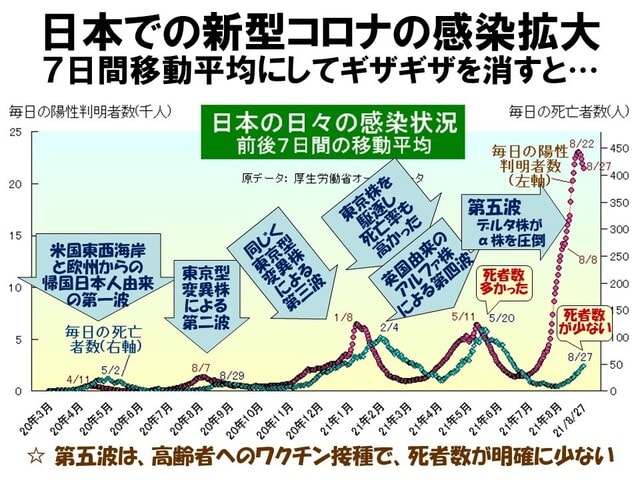
<死者数は少ない>
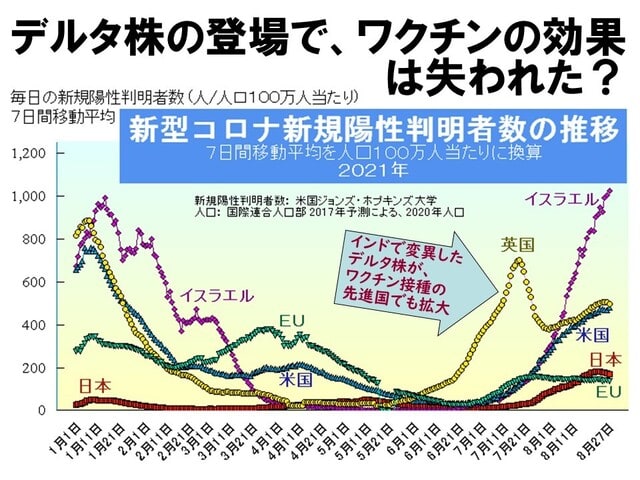
*****************************************************************************************************************************
さて、Ron-sanのLife Storyに戻ります。
チャレンジし、努力する。そして、初めて道が開ける。私にそのことを教えてくれたのはシリコンバレーの人たちでした。
Ron-sanは文化の異なる日本の大学院(上智大学)で勉強を開始、このチャレンジがその後の大きな展開につながりました。
仕事でもプライベートでも。
As the subjects in graduate school became more interesting and demanding on my time, after the first year I decided to reverse the process. I changed from a working visa to a student visa. In order to do that, I had to leave the country and process the visa outside Japan. So, I spend two weeks in the Philippines with several of the other students I studied with. We traveled from Baguio City in the north on Luzon Island to Cebu Island in the center of the Philippines all by bus or jeepney, which was a form of taxi in the Philippines.
At that time, my Japanese was good enough so I could go out and generate my own English classes to support myself. Although I only stuck to the business community, my heart was not into teaching English. I always found myself teaching more business in English to businessmen than just English itself. Also, I learned a great deal about how business was run in the respective companies I taught at. I even wrote several papers for graduate school based on what I learned teaching English. So, teaching English achieved several goals.
Much like my undergraduate studies, about 10% of the material learned was helpful throughout my professional career, but that 10% paid for itself hundreds of times over. My studies evolved around the rapidly developing economies in Asia, foreign exchange, foreign investment and different management styles between western businesses and Japanese businesses. Those management differences learned in graduate school were very helpful when I started working for a large, old-fashion, traditional Japanese company.
As I did a lot of the research by interviewing companies in Japanese, I went through the second time of the exhaustion in using daily the Japanese language, as the subject matter was so different from basic living and daily subjects of conversation. I was now talking about growth industries, management decisions and investment strategies. I really had to develop my Japanese vocabulary to discuss those topics.
As the school was graduate school, many of the students were well into their careers and worked full-time. Therefore, most of the classes were in the evenings. After our classes we would quite often go out for a couple of beers with one of the professors, Professor Hirono from Seikei University. He even published one of my papers in his school’s economic journal. It was on the development of Malaysia, and I was very proud of that 50-page paper. At the time, I had no idea that I would be traveling to the countries repeatedly once I got into my career.
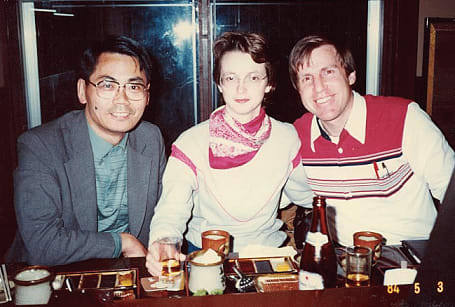
Professor Hirono, Petra Fujiwara
Other people from those beer parties that I still maintain contact with today are Petra Fujiwara and Wayne Toyomura. Petra eventually went back to Germany, her native country and spent many years working for Canon of Germany as their PR Manager. At the time of this writing she’s working for Fuji-Film in Duesseldorf. She married a Japanese guy who lived a great deal of his life in Germany. Wayne was from Hawaii and eventually moved back there.
Both Petra and Wayne are excellent in Japanese and started learning the language about the way I did, but both of them were more serious about it than I was, particularly on the writing side. They have very great depth in the language. I’m more a talker and negotiator.
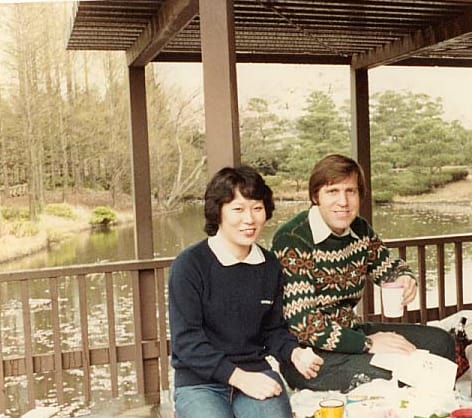
Early days dating <いいね!!「昭和」の外国人感があるね!>
When in graduate school I met my wife Taeko. She was working at the time and had no connection with the school, but I just loved her personality. It was, and still is, very light and happy. She was the perfect match for a serious worrywart like me.
Coming to Japan, studying the language, getting to know the way the Japanese lived and attending graduate school in international business all contributed toward my dream of contributing to the world through working in the international community. A pathway to my goals of global interaction and understanding was starting to become clearer.
本人や政府は、もっと胸を張ってもいいのに、そうしないのは何故か。トランプさんだったら100倍くらいに誇張して言うであろうに。
余裕がなくなっていた?発信力の問題?!
以下、
株式会社 日本総合研究所 主席研究員、株式会社 日本政策投資銀行 地域企画部 特任顧問
藻谷浩介氏、2021年8月30日の講演「オリンピックと第五波の決算 ~ データから見た第五波の真実 ~」より抜粋。
詳しく知りたい方は是非、藻谷氏の講演をどうぞ。資料はいただけます。
<日本はかなり良い方では?>

<ワクチンの効果は?>

<ピークは過ぎた>

<死者数は少ない>

*****************************************************************************************************************************
さて、Ron-sanのLife Storyに戻ります。
チャレンジし、努力する。そして、初めて道が開ける。私にそのことを教えてくれたのはシリコンバレーの人たちでした。
Ron-sanは文化の異なる日本の大学院(上智大学)で勉強を開始、このチャレンジがその後の大きな展開につながりました。
仕事でもプライベートでも。
As the subjects in graduate school became more interesting and demanding on my time, after the first year I decided to reverse the process. I changed from a working visa to a student visa. In order to do that, I had to leave the country and process the visa outside Japan. So, I spend two weeks in the Philippines with several of the other students I studied with. We traveled from Baguio City in the north on Luzon Island to Cebu Island in the center of the Philippines all by bus or jeepney, which was a form of taxi in the Philippines.
At that time, my Japanese was good enough so I could go out and generate my own English classes to support myself. Although I only stuck to the business community, my heart was not into teaching English. I always found myself teaching more business in English to businessmen than just English itself. Also, I learned a great deal about how business was run in the respective companies I taught at. I even wrote several papers for graduate school based on what I learned teaching English. So, teaching English achieved several goals.
Much like my undergraduate studies, about 10% of the material learned was helpful throughout my professional career, but that 10% paid for itself hundreds of times over. My studies evolved around the rapidly developing economies in Asia, foreign exchange, foreign investment and different management styles between western businesses and Japanese businesses. Those management differences learned in graduate school were very helpful when I started working for a large, old-fashion, traditional Japanese company.
As I did a lot of the research by interviewing companies in Japanese, I went through the second time of the exhaustion in using daily the Japanese language, as the subject matter was so different from basic living and daily subjects of conversation. I was now talking about growth industries, management decisions and investment strategies. I really had to develop my Japanese vocabulary to discuss those topics.
As the school was graduate school, many of the students were well into their careers and worked full-time. Therefore, most of the classes were in the evenings. After our classes we would quite often go out for a couple of beers with one of the professors, Professor Hirono from Seikei University. He even published one of my papers in his school’s economic journal. It was on the development of Malaysia, and I was very proud of that 50-page paper. At the time, I had no idea that I would be traveling to the countries repeatedly once I got into my career.

Professor Hirono, Petra Fujiwara
Other people from those beer parties that I still maintain contact with today are Petra Fujiwara and Wayne Toyomura. Petra eventually went back to Germany, her native country and spent many years working for Canon of Germany as their PR Manager. At the time of this writing she’s working for Fuji-Film in Duesseldorf. She married a Japanese guy who lived a great deal of his life in Germany. Wayne was from Hawaii and eventually moved back there.
Both Petra and Wayne are excellent in Japanese and started learning the language about the way I did, but both of them were more serious about it than I was, particularly on the writing side. They have very great depth in the language. I’m more a talker and negotiator.

Early days dating <いいね!!「昭和」の外国人感があるね!>
When in graduate school I met my wife Taeko. She was working at the time and had no connection with the school, but I just loved her personality. It was, and still is, very light and happy. She was the perfect match for a serious worrywart like me.
Coming to Japan, studying the language, getting to know the way the Japanese lived and attending graduate school in international business all contributed toward my dream of contributing to the world through working in the international community. A pathway to my goals of global interaction and understanding was starting to become clearer.
















